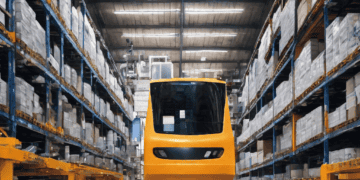Artificial intelligence (AI) is making its mark in the world of trade data analysis, offering the potential to streamline and enhance supply chain operations in both the public and private sectors. With the recent surge in global trade complexities and disruptions, AI models, including ChatGPT, are gaining prominence, promising a brighter future for managing intricate supply chains valued at $32 trillion.
The adoption of machine-learning tools, particularly during the COVID-19 pandemic, witnessed significant growth in government agencies, financial services, and telecommunications sectors. However, the trade industry remained entangled in outdated, paper-based transactions. Generative AI and language-learning models are now stepping in to address this gap, providing the means to manage the world’s convoluted supply lines more effectively.
Julie Gerdeman, the CEO of Everstream Analytics, a supply-chain risk assessment firm, anticipates a future where integrated data from every step in the supply chain will enable highly accurate predictive analytics and forecasting. This data-driven approach will automate decision-making, reduce risk exposure, and enhance supply chain resilience, sustainability, and adaptability.
Trade data analysis is traditionally a complex task, involving sifting through vast quantities of shipping records, often scattered across various subsidiary names and freight forwarders. AI tools are simplifying this process, offering potential benefits to the carbon-intensive engine of the global economy—cross-border commerce.
Private trade-data companies, such as ImportGenius, are leveraging machine-learning tools to recognize customs patterns, scan regulatory documents, and translate foreign languages. This facilitates the production of clear and accurate trade data that is easy to search and analyze. For multinational corporations like Nestle and Mercedes-Benz, AI tools play a crucial role in increasing efficiencies, detecting emerging problems, and ensuring manufacturing processes run smoothly.
While AI has already disrupted numerous industries, its potential impact on the trade sector is particularly significant. The past half-decade of globalization aimed at reducing barriers to the free flow of goods, services, and investment. In contrast, the next phase may see a rise in barriers, such as tariffs, sanctions, and geopolitical uncertainties, which will challenge logistics teams to manage new complexities.
Jake Colvin, President of the National Foreign Trade Council, emphasizes the importance of distinguishing between short-term opportunities and long-term prospects for AI in the trade industry, acknowledging the promise and hype attached to the technology.
One area where AI applications are poised to have a substantial impact is in helping companies and governments better understand changes in global value chains. A recent Group of 20 trade ministers’ meeting endorsed a new mapping framework to identify metrics related to suppliers’ concentration, trade connectivity, trade volatility, and the vulnerability of critical industries. This framework aims to enhance the resilience of global supply chains and develop strategies to mitigate external shocks.
AI tools are expected to play a role in streamlining trade agreements and calculating duties on shipped goods more quickly and accurately. However, it is crucial to acknowledge the limitations of AI in certain aspects of international trade policy. Human involvement remains paramount in negotiations, as AI cannot replicate the nuanced skills of listening, processing, reading body language, and brainstorming on the spot. Data accuracy also presents a challenge due to gaps and inconsistencies in trade statistics, requiring manual verification to ensure reliable information.
As AI continues to integrate with trade data, its role in transforming supply chains and global trade dynamics remains an evolving story worth following.
Discover supply chain news insights on The Supply Chain Report. Enhance your international trade knowledge at ADAMftd.com with free tools.
#AITradeData #SupplyChainAI #MachineLearningTrade #GenerativeAI #SupplyChainResilience #TradeDataAnalytics #PredictiveSupplyChain #AIDrivenSupplyChains #GlobalTradeAI #TradeDataSimplified #AIInLogistics #DataDrivenTrade #SustainableSupplyChains #ImportGenius #EverstreamAnalytics #NationalForeignTradeCouncil















